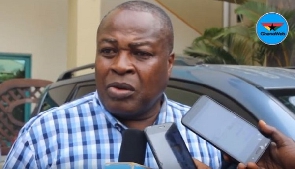Accra, March 6, GNA - The German Ambassador to Ghana, Mr Peter Linder on has commended Ghana for its political stability, functioning democratic structures and ensuring inner security and safety.
He said this was based on the successful ongoing process of democratisation as well as the respect of human rights, freedom of the media and the peaceful cohabitation of religions.
A statement issued in Accra on Monday said Mr Linder stated this at the first Ghana Day celebration at Munich, Germany, on March 2 to enhance German-Ghanaian business relations, to exchange information on Ghana as a business partner and an investment destination for German companies.
The celebration was organised by the Afrika-Verein in collaboration with Rohde & Schwarz of Munich.
Mr Linder described Ghana's macroeconomic results for 2005 as encouraging. Gross Domestic Product (GDP) grew by 5.8 per cent in 2005, inflation has kept a moderate level of 14.8 per cent despite significant fuel price increases, estimated fiscal deficit is 2.2 per cent of GDP, Bank of Ghana's foreign currency reserves cover was 3.7 months of import value.
He told his German audience that Ghana reached HIPC Completion Point in July 2004, which had led to subsequent debt releases by donor countries.
He said Germany cancelled 247.3 million Euros of Ghana's debts in February 2005, while the country also qualified for multilateral debt release by the African Development Bank (ADB), World Bank and International Fund (IMF) and the subsequent debt releases would reduce Ghana's foreign debts to 1.5 billion dollars in 2006.
Mr Linder said access to money had been made easier by the reduction of prime rate by the Bank of Ghana to 15.5 per cent, thus reducing the lending rates within the banking sector. Lending to the private sector increased by 27 per cent in 2005.
"Due to the good macroeconomic indicators as well as political stability the rating of Ghana by international rating agencies (Standard & Poors, Fitch) has been upgraded to a B+, and the assessment of the security of export guarantees by Hermes/OECD from level 7 to level 6. "Prospects for 2006 look promising and the Government of Ghana set an ambitious agenda for further economic development, envisaging that Ghana should reach middle income status by 2015 and a GDP growth rate of eight per cent for 2006."
He, however, identified some threats to further successful development of the Ghanaian economy and urged the German business community to consider and counter by adequate measures.
According to Mr Linder, economic integration within West Africa had to be reinforced.
"But regional integration is, unfortunately, developing only slowly, I should rather say too slowly. Looking at the common agricultural policy, the West African Energy Pool, free movement of goods and persons, customs union or a common currency for the Anglophone countries there remains much work to be done.
"To reach the ambitious aim of eight per cent GDP-growth, Ghana needs to use the potential of the West African market and the advantages of regional integration. The further economic integration within ECOWAS will also be an essential prerequisite of the successful conclusion of the Economic Partnership Agreements negotiations between ECOWAS and the EU."
The Ambassador said Ghana's exports needed to be further diversified; the national economy was still depending too much on the export of a few traditional products, gold, cocoa and timber, which had experienced extreme vulnerable changes of world market prices. "The diversification of production, the creation of domestic industries and the development of a sound private sector therefore have to be continued, supported strongly by the government." He suggested that the energy sector had to find substitutes for the use of oil in energy generation, as oil prices would develop into unpredictable heights.
"Here the completion of the West African Gas Pipeline in December 2006 and the subsequent installation of Gas Power Plants would relieve the budget."
On the public sector the German Ambassador said it remained hardly transparent and the salaries for public officials a heavy burden on the budget.
Reforms, according to him, would reduce the number of ministries and adjacent authorities significantly and redefine their responsibilities.
He said due to the current financial situation and ratings Ghana's access to credits on international markets had been made much easier. However, the Ghanaian government should carefully consider the range of commercial borrowing in order not to incite a new debt-incurring process.
Mr Linder said in spite of these risks Ghana found herself in a very good position within the West African region and sub-Saharan Africa, as far as prerequisites for private sector development and entrepreneur-friendly environment were concerned.
"A recent study by the World Bank put Ghana on top of the list in West Africa as the country where it is easiest to do business and at rank nine among 41 countries surveyed in sub-Saharan Africa. "This and Ghana's overall political and economic stability should make Ghana an interesting destination for foreign investors. Unfortunately German investments still do not match Ghana's potential. Altogether only about 100 investments of German companies have been registered so far."
Mr Linder said German direct investments went into information technology, tropical fruits, vegetables and fat oils and the service sector, including restaurants and hotels.
Trade figures experienced a heavy drop in 2004, where German imports from Ghana decreased by 23 per cent and Ghanaian imports from Germany by 3.1 per cent.
He said a slight recovery could be seen from the preliminary results in 2005. German imports from Ghana are mostly Cocoa (50 per cent), timber (39 per cent) and fruit (5.8 per cent). Ghana imports from Germany vehicles (20 per cent), machinery (19 per cent), chemical products (14 per cent) and technical products (11 per cent). Mr Linder encouraged German and Ghanaian companies to consider the possibilities of the export insurance system.
"The legal framework for Ghanaian-German business relations is still not completed, although an agreement on the mutual protection of investments came into force 1997, the agreement on the avoidance of double taxation signed 2004 is still not ratified," he said. He urged both governments to speed up the ratification process to enable the coming into force of the agreement.
"Both sides should find a way to create more business relations and investments by attracting more interest from the German side and creating more favourable conditions on the Ghanaian side, especially as investment in Ghana will be very interesting from the point of several big projects being planned in Ghana for the next few years," he said. 06 March 06
Click to view details



Business News of Monday, 6 March 2006
Source: GNA
















